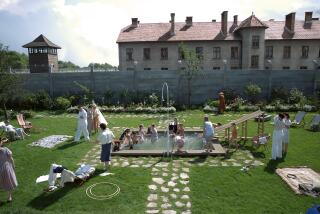Review: ‘Stefan Zweig: Farewell to Europe’ beautifully captures the mysterious life of the once-famed author
- Share via
Intellectually involving and strikingly made, “Stefan Zweig: Farewell to Europe” is a drama based on the last six years in the life of its protagonist, a celebrated writer whose personal essence remained unknowable despite his fame.
Though interest in Zweig’s work is said to be rising, the Austrian author is still relatively unknown in this country, compared to his heyday in the 1920s and ’30s, when he was the most translated European writer on the planet, someone whose death made the front page of the New York Times.
Today, especially for film fans, Zweig is best known for the novella that was the basis of Max Ophuls’ “Letter From an Unknown Woman” and for a sensibility and a body of work that inspired Wes Anderson’s “The Grand Budapest Hotel.”
In addition to being a prolific writer, Zweig was also, in those last years of his life, a well-known exile from Hitler’s Europe, someone who had a terrible time coping with the chaos, displacement and uncertainty of being a nomad estranged from the homeland whose language had always nourished him.
Co-writing (with Jan Schomburg) and directing is top German actress Maria Schrader, still remembered for starring in 1999’s romantic World War II drama “Aimee & Jaguar.”
“Stefan Zweig” is only Schrader’s second film as a director, but, armed with clear ideas of what she wanted to convey and how she wanted to convey it, she’s made a movie that allows its actors to fully inhabit their characters in a potent but low-key way.
This is especially true for star Josef Hader, well known in Austria as, of all things, a comedian, who is brilliant as Zweig. With a face that’s muted, evocative and all but unreadable in repose, he puts us in touch with how deep the writer’s rarely expressed sadness and melancholy ran.
Also unusual for an actor turned director, Schrader has made a visually striking film of strong formal qualities. Beautifully shot by cinematographer Wolfgang Thaler, whose credits include the Oscar-nominated “Theeb,” “Stefan Zweig” is carefully divided into six sections: a prologue, four chapters and an unsettling epilogue.
“I wanted the film to have an immediacy, as if we opened a window six times — for 20 minutes each — to be part of Stefan Zweig’s life in real time,” the director has said, and that is what happens.
“Stefan Zweig’s” visual qualities are especially apparent in the first of those windows, a prologue revealing a gorgeous formal banquet in the writer’s honor that took place in Rio de Janiero in 1936. The camera does not move during the entire scene, while plentiful movement within the frame by actors and extras provides a fine sense of drama.
That master shot also makes the point, without having to say anything, that so much of Zweig’s life in exile was playing a role, being onstage on a very public platform.
As Zweig works the crowd with the most exquisite politeness, you also get the sense of him as a thoughtful, elegant citizen of the world, someone who believed in a borderless Europe and had a special love for Brazil, whose diverse races he saw as “a vision of the future.”
Set only a few days later, the next sequence picks up in Buenos Aires for the intensely political PEN Congress, an international gathering of 80 writers from 50 nations. The pressure on Zweig to condemn Hitler and the rise of Nazism was intense, but, shunning actions he felt were without risk or consequences, he confound his partisans by refusing to do so.
Three of the final four sequences take place in Brazil and involve his much younger second wife, Lotte (Aenne Schwarz). These vary in tone from the serious to the absurd, including a comic opera reception with a small-town mayor.
The scenes also showcase Zweig’s continual involvement with helping fellow writers escape from Europe, and his alternating determination, frustration and despair at the process and what it took out of him.
Zweig is especially overwhelmed in a sequence in Manhattan in which he reunites with his first wife, Friderike, played by the veteran Barbara Sukowa. As the director notes, “Zweig’s greatest gift as a writer, his imagination and empathy, transformed from being a blessing into a curse.”
Finally, the reasons for Zweig’s most perplexing actions, including those revealed in the film’s beautifully filmed epilogue, have to be remain unknowable mysteries. But it’s the triumph of “Stefan Zweig: Farewell to Europe” to make this insolubility not frustrating but a source of satisfaction.
###
‘Stefan Zweig: Farewell to Europe’
No rating
Running time: 1 hour, 46 minutes
Playing: Laemmle’s Royal, West Los Angeles, Town Center, Encino
See the most-read stories in Entertainment this hour »
Movie Trailers
More to Read
Only good movies
Get the Indie Focus newsletter, Mark Olsen's weekly guide to the world of cinema.
You may occasionally receive promotional content from the Los Angeles Times.











